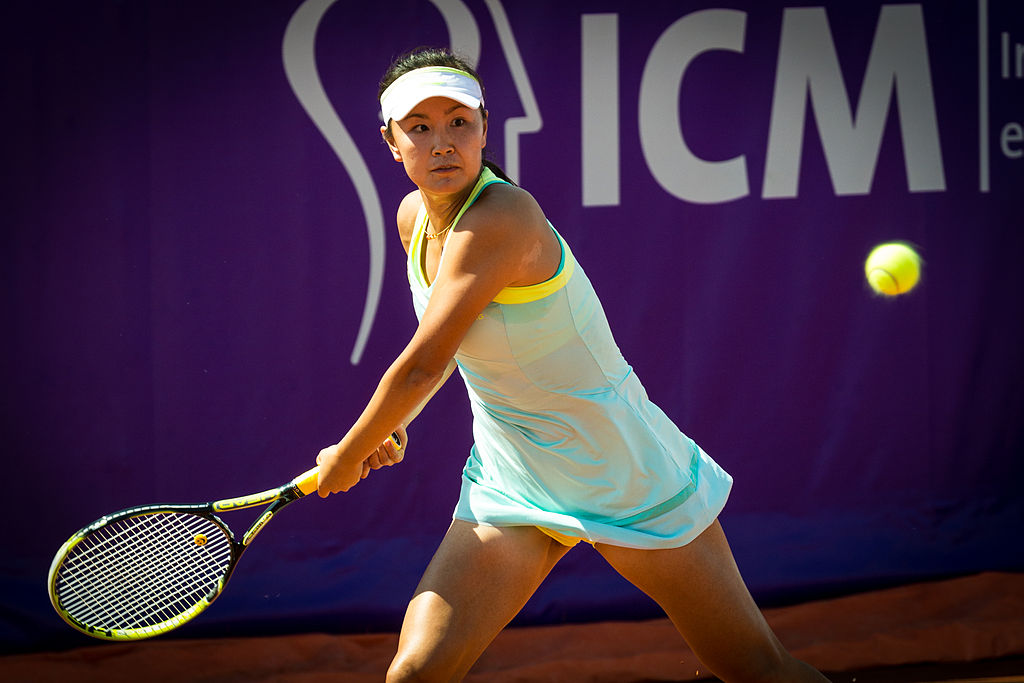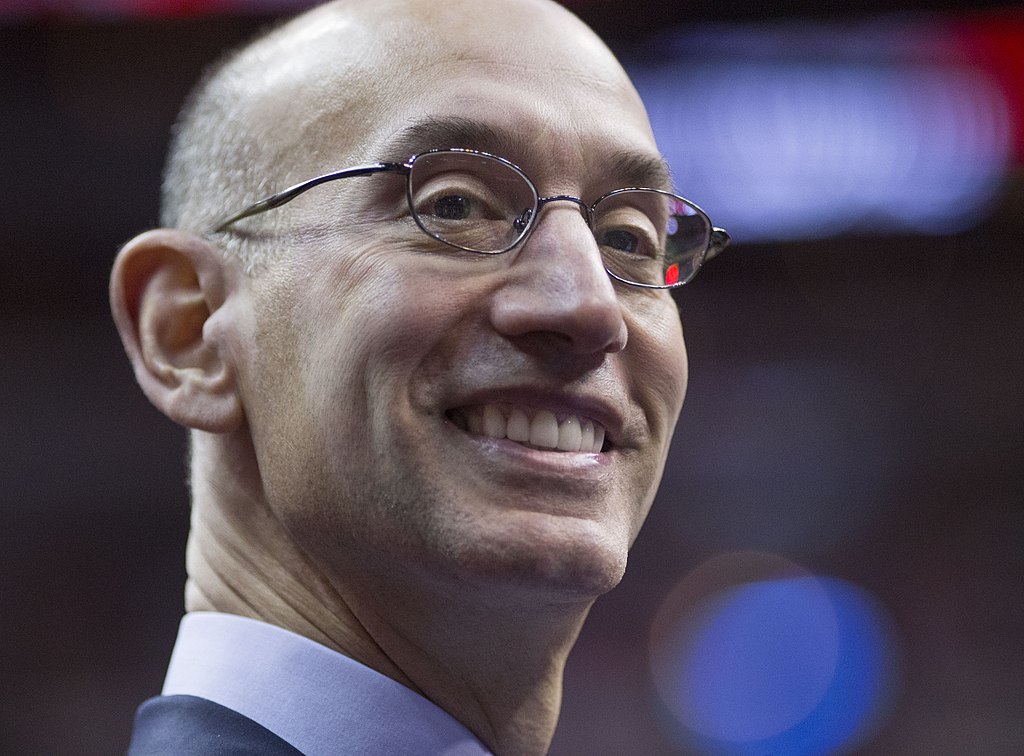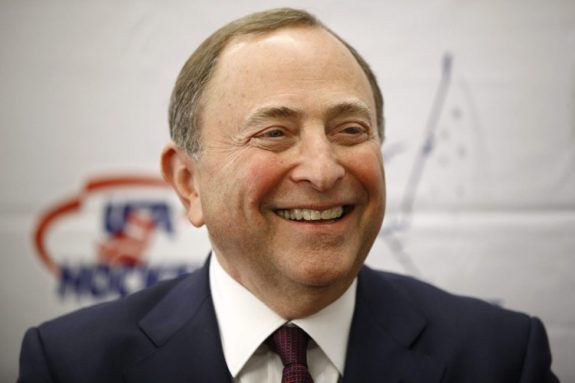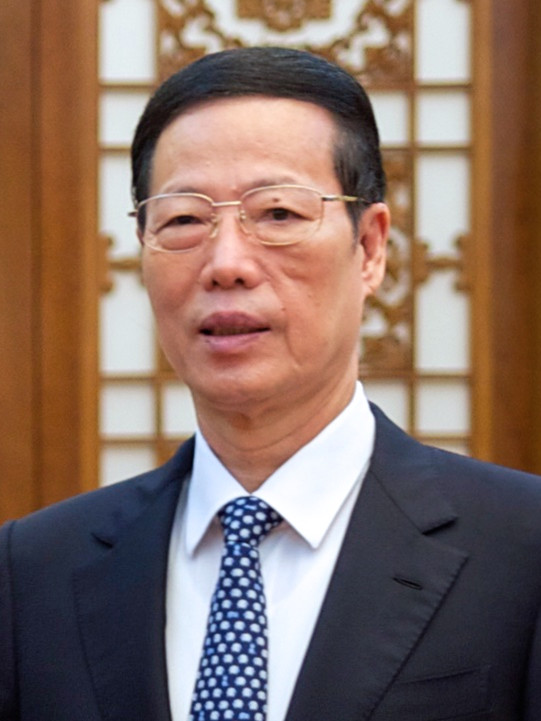The NHL should pull out the 2022 Winter Olympics in protest over the Chinese government’s treatment of tennis star Peng Shuai. What’s more, it should stop playing footsie with Chinese dictators and end its efforts to establish its brand in China. That’s both the ethical thing to do and the best for its business.
Related: Chinese Hockey Expanding at an Astonishing Rate
Unless you’ve been living on another planet this past month, you’ll know about Peng, one of China’s top-ranked women tennis players who, in a Nov. 2nd Chinese social media post, accused Zhang Gaoli, a former Vice Premier of China, of sexually assaulting her. Beijing’s authoritarian government removed her post, gagged her and steadfastly ignored calls to investigate the accusations. Peng disappeared for several weeks last month and, while she has since reappeared in staged videos released by the government, the Women’s Tennis Association (WTA) said it still has, “serious doubts that she is free, safe and not subject to censorship, coercion and intimidation.”

Other than the WTA, no other sports body, and certainly not the International Olympic Committee (IOC), has mustered the courage to express anything more than “concern” over Peng’s treatment. Ever so fearful of losing favour with Chinese dictators, its executives have adopted the posture of little puppies, tongues hanging out, rolling around in Tianamen Square hoping to have their bellies rubbed by a member of the Chinese Politburo.
Not a peep has been heard from the NHL about Peng – not from Commissioner Gary Bettman nor any NHL player. The league remains Beijing-bound, determined to compete in the Winter Olympics. The question is, should it be? And if it must, then can it at least work up the nerve to speak out against Peng’s treatment?
Peng Case Poses Ethical Dilemma for NHL
The NHL knows it can’t avoid the social and political issues of the day. That’s why the Chicago Blackhawks paid $2 million in fines earlier this year for their role in the Kyle Beach sexual assault scandal and the league put the heads of one-time Blackhawks’ head coach Joel Quenneville and Blackhawks’ general manager Stan Bowman on a pole in the proverbial public square.

As Bettman put it, “If this horrible situation should serve any constructive purpose, it’s to demonstrate that this (sexual assault and harassment) will not be tolerated. And if you have a problem in your organization, you better deal with it. And if you’re in a position of authority, you shouldn’t be overlooking it, because there’ll be a consequence to that.”
Strong words, but surely the NHL’s position can’t be that they will stay silent on high profile cases of sexual harassment like Peng’s in other sports. Does its silence about Peng say it believes women’s rights are fine for the West but not for women in China where those rights are suppressed and sexual assaults committed by powerful men are covered up?
Not only that, but silence on Peng’s case taints the league’s credibility on the other social justice issues it has tried to address. The NHL has taken on racism as an issue, LGBTQ+ rights in hockey, mental health and spearheads the “Hockey is for Everyone” initiative that uses the league’s global influence to provide a positive environment for players, families and fans of every race, colour, religion, national origin, gender, age, sexual orientation, socio-economic status and those with disabilities.
The NHL has been forceful in its statements about addressing the problem of sexual assault in its own backyard. Even so, how serious can the NHL be in all of this if it can’t speak out about Peng?
China Is Bad for the NHL’s Business
If ethics aren’t enough for the NHL to speak up against what the Chinese government has done to Peng and pull out of the Winter Olympics, then naked self-interest should be.
The Peng case is just another example of the way in which China has become a rogue state. There is its well-documented and ongoing genocide of its Uyghur minority in Xinjiang province. It has extinguished democracy in Hong Kong, threatened to invade Taiwan, rattled its sabres on its border with India, resorted to gunboat diplomacy to enforce its illegal territorial claims in the South China Sea, used kidnapping as an instrument of foreign policy and meddled in democratic elections in the West. It violates its international trade agreements, brazenly steals technology and extorts foreign companies who do not comply with its dictates.
Given the insidious nature of the communist cabal that runs the Chinese government, Western companies doing business in China face the risk of reputational damage to their brands and the reality that the value of their investments there depends on the caprices of despots. Just ask the National Basketball Association (NBA).
In 2019, then-Houston Rockets general manager Daryl Morey came out on Twitter making comments supportive of the pro-democracy protests in Hong Kong. In retaliation, the Chinese government pulled the NBA’s games off CCTV-5 – the state-owned sports broadcaster. NBA Commissioner Adam Silver described the resulting losses as “substantial” and likely in the “hundreds of millions of dollars.”

This fall, CCTV-5 returned to broadcasting NBA games, but only after an article was published in the Global Times, a mouthpiece of the Chinese Communist Party (CCP), crowing about how “NBA executives had realized their mistake and shown goodwill to make up for it.” The article warned that “the doors to further access the Chinese market, and whether the NBA could further tap into the market, still depend on their performance in the future.” As for Morey, he kowtowed to Beijing in a follow-up Tweet saying that he had not meant to “cause any offense.”
Muzzling itself and falling in line with Beijing’s wishes makes a toady of the NBA. Not only that, but it has put the league between a rock and a hard place. In the USA, the NBA has been criticized across the political spectrum by Democrats and Republicans, like Texas Senator Ted Cruz, who accused it of capitulating to a repressive regime to fatten its profits. Not only that, but the league has also been accused of “undermining American values.”
The NBA can weather blowback from its fans in the USA because there are far more basketball fans in China—half a billion by some counts—than there are stateside. (from, “China continues to limit NBA’s exposure to fans months after controversy”, 10/2/2020) The NHL certainly can’t, at least not now. While the NBA’s revenues from China exceed $5 billion, those of the NHL are believed to be inconsequential. The question for Bettman is whether they justify the risk of damage to the NHL’s in its key North American markets.

There are many cautionary tales from Western companies who have run afoul of Beijing. Speaking about the number of Western firms facing a boycott after they questioned abuses in Xinjiang province, Chinese Foreign Ministry spokeswoman Hua Chungying said, “Anyone who offends the Chinese people should prepare to pay the price.” The list of those who have includes Starbucks, Cathay Pacific Airways, Nike, Adidas, Puma and H&M.
The NBA’s ban in China shows the determination of Beijing to use access to the vast Chinese market as a tool to keep Western companies in line with Chinese foreign policy and keep quiet about the violation of the rights of its citizens. The Chinese market is a Faustian bargain and the NHL would be foolish not to recognize that.
Like it or not, the NHL has always been involved in the politics and social issues of the day. It will become even more entangled as it evolves to meet the demands of a new generation of fans who want the businesses they patronize, including professional hockey, to reflect their values and beliefs. That makes remaining silent about Peng especially risky for the league.
Related: NHL Can’t Hide From the Political and Social Issues of the Day
If the plight of Peng were to help reignite the Chinese #MeToo movement, the NHL and other sports leagues would likely face demands, especially from women from across the Western world, to take a position on Peng and China’s unwillingness to investigate her accusations of sexual assault against Zhang. Given that 40% of its fans in North America are women, the NHL would find itself in a difficult fix. (from, “Still a long way to go ‘but women are gaining ground with new roles in NHL’, USA Today, 5/12/2019)

The patriarchal nature of Chinese society is well known and Peng’s story is not a new one. (from, “Why Peng Shuai Has China’s Leaders Spooked, New York Times, 2/12/2021) More Chinese women assaulted by powerful men are fighting back and speaking out against them. Richard Liu, one of China’s most famous business tycoons was arrested but never charged after he was accused of rape in 2018. Broadcaster Zhu Jun, a household name in China, faced accusations of sexual assault.
Dictatorships like China’s are unstable because there is no release valve for dissent. This has led to many uprisings over the course of the country’s long history. Beijing knows this and it’s why, according to Yacqui Wang, Senior China Researcher with Human Rights Watch that, “Peng’s case will inspire Chinese women to speak out. As he put it, “People say, ‘Wow, she knows the consequences and she has so much to lose by making the allegation, but she’s still doing it’, so people feel inspired by her.”
If the Chinese #MeToo movement is spurred on by Peng’s plight, the NHL will find itself on the wrong side of history. That’s always bad for business. To ensure it doesn’t find itself there, it needs to speak out in support of her.
The Olympics Are Also Bad for the NHL’s Business
The NHL must be salivating at the prospect of earning even a fraction of the billions the NBA is generating in China. It understands that participation in the Olympics could be a step toward realizing those riches. As Deputy NHL Commissioner Bill Daly put it in a recent interview, “There’s no doubt the Olympics are a critical element of the growth of ice hockey in China and the exposure to the people of China for the game of hockey.” Even so, the NHL needs to think carefully about the consequences of partnering with the IOC to promote its game there.

In steadfastly refusing to challenge Beijing over Peng’s plight and accepting the staged videos of her as evidence that she is well, Wang says the IOC is, “actively playing a role in the Chinese government’s enforced disappearance, coercion and propaganda machinery”. That’s a stench that’s hard to mask and it could rub off on the NHL.
The IOC’s unwillingness to criticize the Chinese government in the Peng case is one thing, but it’s hard to ignore its legendary crooked dealings and history of playing footsie with autocratic regimes. (from, “The Olympics Have Lost Their Appeal”, The Atlantic, 7/8/21) To establish itself in China, does the NHL really need to associate itself with an organization that is as morally bankrupt as the IOC? If it decides it does, shouldn’t it be asking itself whether that’s business worth having?
Worse still for the NHL’s image is actually participating in the Winter Games in Beijing. In doing that, it legitimizes a rogue regime that has spurned the norms of international law and standards of decency with breathtaking insouciance.
The NHL is ambivalent about Olympic participation and that includes Beijing’s games. What’s more, most who lace up to play in the league have no hope of ever competing in the Olympics and are probably indifferent about whether the league participates. In addition, many owners view the two-week break in the league’s schedule to accommodate the games as an expensive inconvenience that puts their top players at risk of injury.
Related: NHL Should Skip Olympics in Favour of World Cup of Hockey
It’s hard to see how a decision not to participate in the games, especially with the threat of Covid-19 hanging over this year’s games, would be strongly opposed by any but a minority of players. With China now held in such low disregard in Canada, the USA and Europe, the NHL may not see much blowback from its core fan base over a decision to abandon the games.
The NHL Can’t Let WTA Face China Alone
On Dec. 1, WTA chairman Steve Simon announced “the immediate suspension of all WTA tournaments in China” and demanded “a full and transparent investigation – without censorship – into Peng’s sexual assault accusation”. That decision by some estimates will likely cost the WTA $100 million in lost revenue in China. Still, that’s not enough to make the WTA abandon its principles.
For the WTA, the issue is a matter of women’s rights. As Simon explained, “if powerful people can suppress the voices of women and sweep allegations of sexual assault under the rug, then the basis on which the WTA was founded – equality for women – would suffer an immense setback. I will not and cannot let that happen to the WTA and its players.”
Are the NHL and other men’s sports leagues really going to sit back and let the WTA take on the Chinese government by itself? Isn’t it time that male athletes and the leagues in which they compete step up in solidarity with their sisters in the sporting world and oppose the Chinese governments’ treatment of Peng?
The NHL can lead the way by pulling out of the games and speaking out about what has happened to Peng. Ethics and its own self-interest require it.
